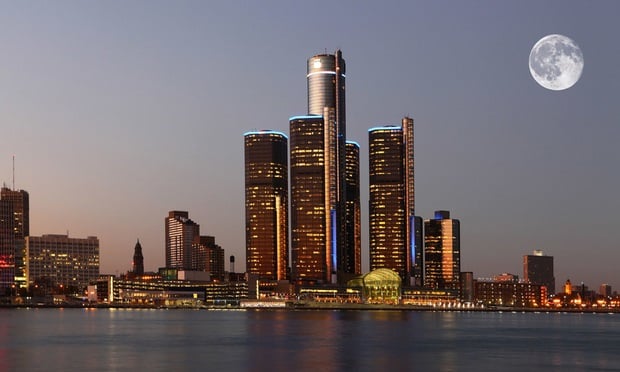"The previous administration took it upon itself to attempt to dictate a location for permanent casinos--the riverfront just east of Downtown," he adds.
Administration officials told the city council the land needed could be purchased for less than $250 million. The casinos loaned the city of Detroit $150 million to buy property on the riverfront. He said more than $143 million has been spent to acquire about one-fourth of the land needed.
"There are no casinos on the riverfront, and we owe the casinos $150 million," Kilpatrick says. "A process that should have taken months has taken years, has poorly served the city of Detroit by building temporary casinos, not permanent sites, has produced windfall profits for lawyers and has not yet yielded certainty or finality."
Instead of receiving the full benefits of casinos and what they bring in terms of tax revenues, development and jobs in the shortest possible time, Kilpatrick says the city has three temporary casinos and a debt of $150 million.
The mayor said the city has been negotiating with the casinos over the last two months to come up with a plan for permanent sites.
"As we have done that, we have told them finding a permanent site is their responsibility, not ours, but that the site should fit into the overall structure and scheme of development downtown," Kilpatrick says.
He adds the city remains hopeful it can meet the March 31 target date of reaching a final agreement with all three casinos for permanent facilities.
Greektown Casino, the MGM Grand Casino and MotorCity Casino all built what were deemed temporary facilities in the last three to four years. The plan announced then by former Mayor Dennis Archer was for all three to build large permanent casinos along the Detroit River Downtown, at a cost of about $2 billion.
The casinos are now only allowed to use 75,000 sf of gaming space in their temporary facilities. A move would allow them to open up 100,000 sf of gaming space.
However, the city had the responsibility of acquiring the riverfront landfor the project, and could not gather enough property. A few land owners either refused to sell or held out for more money.
Subsequently, Archer declared last year that Greektown and MotorCity would likely stay at their temporary facilities, and MGM may build a permanent casino on the river.
Now, residents and businesses are awaiting the plans of Kilpatrick and the city council. The new mayor has said he would like to have a park on the planned casino property.
According to the Michigan Gaming Control Board, the three casinos together earned more than $1 billion in 2001. The state takes 8%, about $80 million, for K-12 classroom education. Detroit takes another 9.9%, about $100 million, for development and improvements in the city.
Want to continue reading?
Become a Free ALM Digital Reader.
Once you are an ALM Digital Member, you’ll receive:
- Breaking commercial real estate news and analysis, on-site and via our newsletters and custom alerts
- Educational webcasts, white papers, and ebooks from industry thought leaders
- Critical coverage of the property casualty insurance and financial advisory markets on our other ALM sites, PropertyCasualty360 and ThinkAdvisor
Already have an account? Sign In Now
*May exclude premium content© 2024 ALM Global, LLC, All Rights Reserved. Request academic re-use from www.copyright.com. All other uses, submit a request to [email protected]. For more information visit Asset & Logo Licensing.






